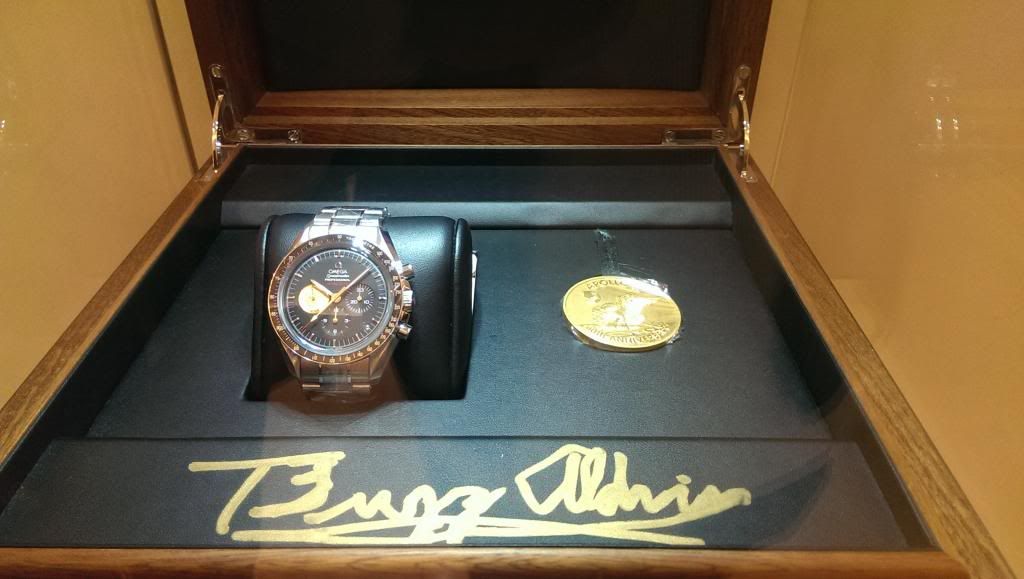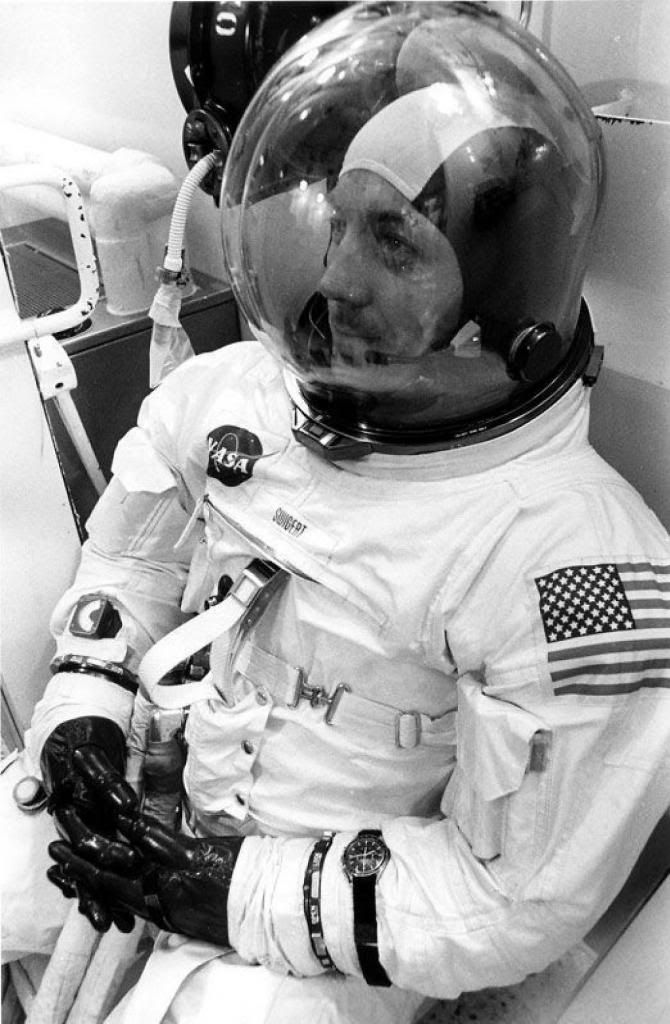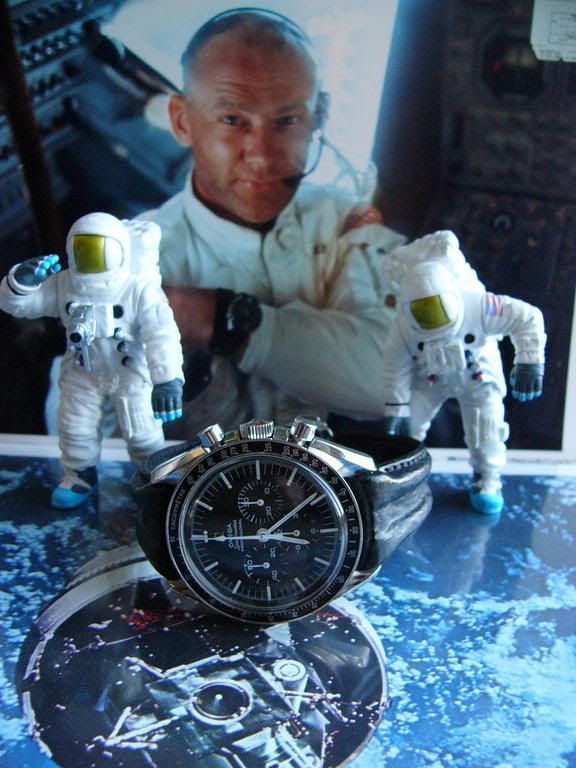Den eneste klokken NASA stoler på
- Trådstarter Dr. Fiddy
- Opprettet
Du bruker en utdatert nettleser. Det kan ikke vise dette eller andre nettsteder på riktig måte.
Du bør oppgradere eller bruke en alternativ nettleser.
Du bør oppgradere eller bruke en alternativ nettleser.
SpaceCowboy
Støttemedlem
Skulle jeg kun ha beholdt EN klokke....
haddde denne vært en av dem
SpaceCowboy
Støttemedlem
Hehe, en kollega av meg kommenterte denne i dag(Han vet jeg har sansen for ur). "Har du en sånn omega 1861" hvor jeg sa "En speedy? en slik mener du?" hvor jeg rekker opp hånden og viser fram uret jeg har på i dag. Han ble ganske forfjamset over at jeg ikke bare hadde uret men også hadde det på den dagen  Nå skal det sies at det sitter en 861 i min da
Nå skal det sies at det sitter en 861 i min da 
Hvis det tar 14 måneder å montere uret - som artikkelen sier (at Omega sier) - så må 30K være et røverkjøp.
Litt irriterende at jeg ikke liker denne like godt IRL som på bilder.
Litt irriterende at jeg ikke liker denne like godt IRL som på bilder.
Fin artikkel, bokmerkes til en gang jeg må "forsvare meg" 
Det samme slo meg. I call BS.
Men jeg lurer på hva det egentlig skulle stå, dvs hva ble lost in translation her?
Hvis det tar 14 måneder å montere uret - som artikkelen sier (at Omega sier) - så må 30K være et røverkjøp.
Det samme slo meg. I call BS.
Men jeg lurer på hva det egentlig skulle stå, dvs hva ble lost in translation her?
Det blir mer og mer tydelig for meg at jeg MÅ HA en Speedy så snart klokkekontoen tillater det.
Er det noen med tynne håndledd (rundt 16 cm) som kan bekrefte/avkrefte at den ikke blir altfor stor? Jeg har vurdert "reduced" også men jeg har absolutt mest lyst på "originalen".
Er det noen med tynne håndledd (rundt 16 cm) som kan bekrefte/avkrefte at den ikke blir altfor stor? Jeg har vurdert "reduced" også men jeg har absolutt mest lyst på "originalen".
Det blir mer og mer tydelig for meg at jeg MÅ HA en Speedy så snart klokkekontoen tillater det.
Er det noen med tynne håndledd (rundt 16 cm) som kan bekrefte/avkrefte at den ikke blir altfor stor? Jeg har vurdert "reduced" også men jeg har absolutt mest lyst på "originalen".
Jeg har hatt begge og konkluderte raskt med at reduced ble for liten og ikke "originalen". Jeg er litt usikker på håndleddene mine men de er normale vill jeg si. rundt 17-18mm
Det blir mer og mer tydelig for meg at jeg MÅ HA en Speedy så snart klokkekontoen tillater det.
Er det noen med tynne håndledd (rundt 16 cm) som kan bekrefte/avkrefte at den ikke blir altfor stor? Jeg har vurdert "reduced" også men jeg har absolutt mest lyst på "originalen".
Som andre har jeg også hatt begge og det er 3750.50 du vil og skal ha
Det blir mer og mer tydelig for meg at jeg MÅ HA en Speedy så snart klokkekontoen tillater det.
Er det noen med tynne håndledd (rundt 16 cm) som kan bekrefte/avkrefte at den ikke blir altfor stor? Jeg har vurdert "reduced" også men jeg har absolutt mest lyst på "originalen".
@Auto Winder
Slik ser en 3573.50.00 ut på 16cm håndledd. Jeg opplever den ikke som (for) stor, men andres øyne opplever ting annerledes.




Redigert av en moderator:
Takk for bildene @Tetragrammaton; dette fungerer fint! Da sitter den trygt på toppen av ønskelisten@Auto Winder
Slik ser en 3573.50.00 ut på 16cm håndledd. Jeg opplever den ikke som (for) stor, men andres øyne opplever ting annerledes.

Redigert av en moderator:
Slenger med ett bilde jeg tok på Omega Boutique på 5th ave i New York.
Angrer på at jeg ikke brukte litt mer tid og tok noen flere og bedre bilder der, mye fint å se på.

Den er limitert til 69stk... Det er første gang jeg ser "bilde" av den
Hvilken pris var det på den?
Den er limitert til 69stk... Det er første gang jeg ser "bilde" av den
Hvilken pris var det på den?
Ligger en på bukta og. Nord for 100k...
Dollar...
Wow! Det var jeg ikke klar over.. Trodde det var en "vanlig" limited edition jeg. Kan angre nå på at jeg ikke studerte den nøyere!
Pris? Var ingen prislapper i butikken og ikke spurte jeg..
For de som vil lese litt om modellen: http://omega.watchprosite.com/show-forumpost/fi-677/pi-3097771/ti-512766/t-/
Pris? Var ingen prislapper i butikken og ikke spurte jeg..
For de som vil lese litt om modellen: http://omega.watchprosite.com/show-forumpost/fi-677/pi-3097771/ti-512766/t-/


Nearly half a century of adventures in space
It was the only wristwatch to have withstood all of the U.S. space agency's severe tests under conditions of zero gravity and magnetic fields, extreme shocks, vibrations and temperatures ranging from -18 to +93 degrees Celsius.
In the same month, the watch was the Speedmaster was worn on board the Gemini 3 mission. It was the first “official” trip for the rugged chronograph but it had already flown in space twice during Project Mercury.
The most memorable moment in the Speedmaster's history was undoubtedly 21 July 1969 at 02:56 GMT, when it recorded man's first steps on the Moon's surface. The Apollo 11 mission was a milestone in history and the Speedmaster became the first watch (and the only watch since) to be worn on the Moon. With this unique accomplishment came a unique nickname: the Moonwatch.
“. . . flight qualified by NASA for all manned space missions.”
In April 1970, the OMEGA Speedmaster contributed to the rescue of the Apollo 13 mission from a potential disaster, earning OMEGA the "Snoopy Award", the highest distinction awarded by the NASA astronauts. In another historical event, the Speedmaster was worn on the wrists of both the American astronaut Tom Stafford and the Russian cosmonaut Alexei Leonov during the historic Apollo-Soyuz space rendezvous. This was the first time the cosmonauts also wore the OMEGA Speedmaster. Ever since, the Speedmaster has been the official chronograph of all Russian manned space missions.
As space exploration continued to break through new frontiers, the OMEGA Speedmaster was again selected by NASA in 1978 as its official chronograph for the new Space Shuttle programme following a new series of harsh tests.
The Speedmaster was later subjected to additional gruelling tests on board the Russian space station MIR between July 1993 and July 1994. The success of these exceptional endurance tests was attested by a certificate initialled by the MIR crew. The OMEGA Speedmaster had become the most tested watch in the world.
Russia's pioneering space station MIR was again used as an orbiting test laboratory in 1998 for OMEGA's X-33 multifunction chronograph. After successful completion of the tests, MIR also offered a unique opportunity to introduce the watch to the public via a live satellite link-up with the Houston Space Center.
The Speedmaster X-33 has been flight-qualified by both NASA and the Russian space agency and is part of the standard equipment avaliable to all astronauts and cosmonauts. However, the legendary OMEGA Speedmaster Professional also remains the only watch certified for extra-vehicular activity.
OMEGA Watches: Speedmaster History
Del:




